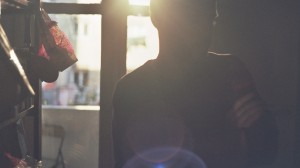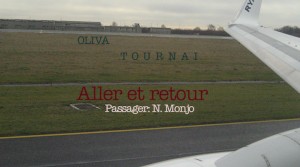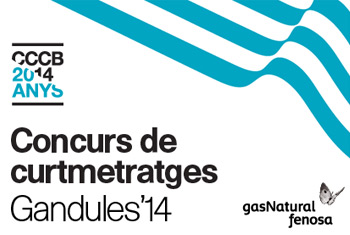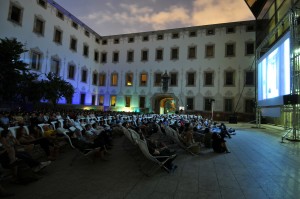From one end to another, from east to west, sailing the seas and oceans, breezing through airports, packing and (un)packing suitcases, talking other languages – or at least trying to, with the Andalusian and amusing touch of Spaniards in London, by Javier Moreno. Alone, or in company. Feeling at home far away, or terribly nostalgic. In this new edition of Gandules’14-Gas Natural Fenosa we will be travelling a great deal, without spending a euro and without suffering jet lag. We will travel by land, sea and air based on already-recorded images and the private views of the directors of over 20 finalist short films. A few days before the online voting deadline, we’ve decided to approach them and find out a few more things.
First stop: Berlin. We will be visiting the German capital twice, first of all with Gabriel by Alice Cugusi, where we witness the interior monologue of a writer in crisis. Cold and closed, it is not an easy city to adapt to, and even less so when there is a yearning. A long-distance love, like that of Anna Mitjà, director of Tu i Berlin, (another) thought-provoking portrait of the city and of that love that arrives precisely when different paths must be taken. Travelling is also this: taking diversions, leaving behind unfinished stories.
“Every time I take a flight I feel the urge to get my camera and let myself be carried away by a new story.” These are the words of Helena Bonastre, responsible for El viatge, which takes us from Barcelona to Maastricht in little more than 13 minutes. Objective: to find work. The same as so many other people! Today and in the past. Since time immemorial there have been people saying goodbye, farewell, Adéus (title of the short film by Antón Varela and María José Pérez), see you soon, until I don’t know when, hugging each other with a lump in their throat. “The idea is born from the perception of seeing how close families and friends find themselves forced to pack their bags and leave.” This is Galicia, but it could easily be Malaga. Everything is like in Lugares comunes, the short film by Dela Márquez and Pablo Díaz, “a small tribute to all those emigrants of yesterday and today”. In this case, inspired by the story of a nurse from Malaga who has been living in Düsseldorf (Germany) for the last two years. A goodbye like that of the grandfather of the protagonist of Toledo, Ohio, who left to “do the Americas” in the 1940s, and who knows if he ever came back, an exercise of combing through the past to find one’s origins, one’s roots. Like the search around Patagonia for the father of Diana Toucedo in Imágenes secretas. “My knowledge of my father had been based for years on mere ideals [...]. Eventually I wanted to get closer to him than I had ever been capable.” And, without leaving Argentina, Viceversa, by Mexican Atzin Ortiz, narrates a return home, “a fictional representation of my own departure”. Leaving Buenos Aires at the end of seven years with the long etcetera that accompanies a goodbye.
We travel ever lighter in terms of luggage, we have become post-modern nomads capable “of learning to live with a new family, other customs and another language”, says Núria Monjo, creator of Aller et retour. After her Erasmus stay in Tournai (Belgium), it was her turn to say goodbye and store away the memories. Only those that there was room for, of course. As in Udlandet, by Aina Pociello, another Erasmus in images; in this case, a year of experiences in Copenhagen. “Travelling means opening and closing cycles, starting an adventure, learning a new language or even changing your name”, such as Polish Míjau (Michael in Germany, Miguel in Spain), by Olaia Sendón: “I have not chosen a journey, nor a destination, the only thing that I chose was a person who took us from one country to another without us moving.” Michael has lived in four different countries during his life.
Some people here, some people elsewhere. The Barcelona that we know is also full of stories. Las tardes (The Afternoons) of Teresa, the Ecuadorian protagonist of the short film by Alba Molas, is an everyday example of it: a woman who tries to keep going by working as a cleaning lady and caring for the child of a family. The Primers dies (First Days) of Pakistani Ahmad (a short film by incoming new pupils at the Institut Milà i Fontanals) is a reflection on the experiences of recent arrivals in Barcelona. In their own voices, and based on real events. A lone journey that shows what the discovery of a new city is like. Pakistan is also the country of origin of the protagonist of Ashgbar, diario ambulante, by Violeta Blasco, a documentary portrait about a group of Pakistanis selling souvenirs in the Parc Güell: “I wanted to talk about that forgotten face of the city of Barcelona, that under a presumed cosmopolitanism hides an evident marginality.” And margins, and social changes, are also the subject of Encajados, by Albert Bougleux, diverse portraits by some of the neighbours of the neighbourhood of La Ribera, in Montcada i Reixac, a working-class neighbourhood marked by a heterogeneous and conflictive migratory identity. Apart from this, African immigration acquires a very important role in 9 dies, by Imma Gandia and David Castro, “a documentary portrait that establishes a comparison between the totalitarianism that is described by Hanna Arendt in Los orígenes del totalitarismo and determined social behaviours, seen today, towards immigration from countries in the South”. Based on conversations with Josufa No, which caused a major impact on the two directors, this short documentary film shows the rawest, most incomprehensible and difficult marginalisation. The suffering of many recent arrivals and the day-to-day of an immigration that is far from pleasant.
And thus our journey ends, a giant journey. When somebody says “I’m away from home” there are many things, many stories, remaining to be told. End of journey.
Remember that you still have time until 6 July to cast your votes for the nine finalist short films of this year’s Gandules.











